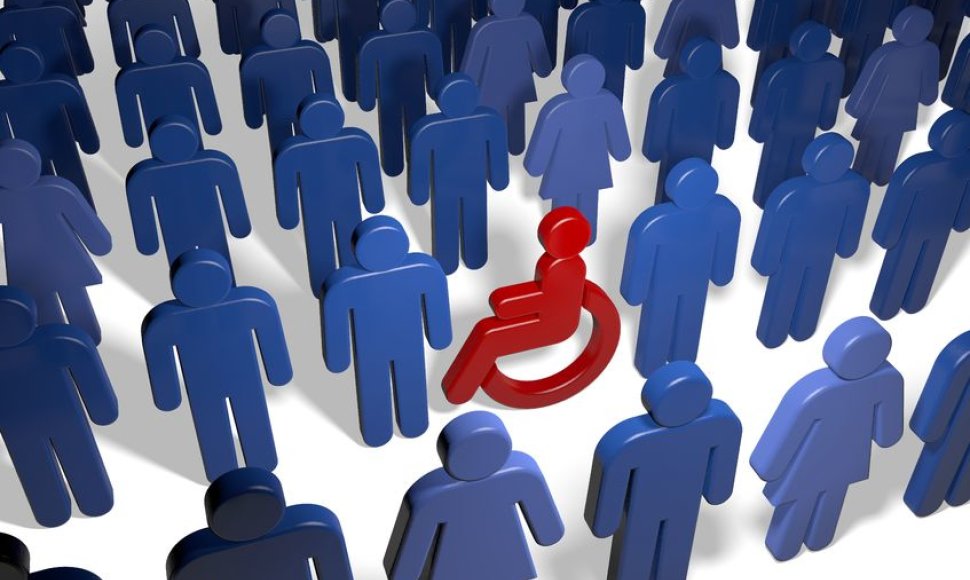Moreover, some disabled students are not in need of wheelchair-accessible lecture rooms but rather specially-trained tutors. These might be the reasons why the number of disabled students gets smaller each year.
Special lifts
In mid-July, Kaunas Vytautas Magnus University (VDU) announced it has installed special lifts in its 4th House on Daukanto Street to take people up and down stairs.
“Socially responsible and disabled-friendly VDU has adapted the building to students with impaired mobility on its own funds. The upgrade was much needed, since the building houses many departments that service students: students affairs service, students union, international office, career centre,” Mantas Simanavičius, director of the students affairs service, said in a press release.
According to him, the three installed lifts (one outside and two inside the building) were needed due to the increase in student numbers – Arts Faculty students will have their rehearsal and performance space here starting this September. The building was also equipped with bathrooms for the disabled. All the improvements were financed from funds raised during VDU charity events.
Accessibility ends at threshold
Despite the upgrade, Lithuanian universities and colleges are still ill-equipped to receive students with disabilities, so their numbers go down each successive year (one exception is Kaunas University of Technology where the number of disabled students went up from 70 to 91). According to an annual survey by the Lithuanian Students Union (LSS), there were 878 students with disability in Lithuanian schools this year (more than half of them must pay in full or in part for tuition), 996 a year before, and 1,026 in 2009-2010.
The main reason for the gradual decline is not less enthusiasm among people with disabilities to pursue higher education. According to the survey, they are eager to integrate and be equal participants of the education process. More than half of them choose full-time studies. There was a significant increase in master course students (31 percent, up from 8, of all disabled students).
“In practice, not a single higher-education institution is fully equipped to accommodate people with impaired mobility,” says LSS project manager Vytautas Valentinavičius. “Many of the people we polled said that lectures were held in lecture rooms that were adapted to disabled students on the ground floor. This is degrading, as students have a right to move everywhere and to know what is happening on upper floors. And what if there is an event there? This situation creates incubators of sorts – all lectures are given on one floor only, close to special bathrooms.”
Valentinavičius mentions new amenities installed at a new building of Mykolas Romeris University: a special lift, a drive-in to the cafeteria. In the old building, he says, unassisted disabled students could not either reach administrative floors or the dining room. In Kaunas department of the International School of Management, wheelchair-bound students can easily access the lecture amphitheatre, but hardly move around inside.
This year, every third institution of higher education in Lithuania claims to have auditoriums, administrative offices, WC facilities, and common rooms adapted to students of challenged mobility. Last year, only one in four did. 39 percent say their premises are in part accessible (e.g., one can reach lecture rooms by wheelchair but not administrative offices), while 28 percent admit to being not adapted to students with disabilities at all. Some say they are currently equipping their buildings with special amenities like lifts for wheelchairs, etc.
Disabled lecturers
There are 47 registered public and private higher education institutions in the country, 42 of them agreed to take part in the survey. Only four of them – the Lithuanian Military Academy, the High School of Navigation, Telšiai Bishop Vincentas Borisevičius Seminary, and Vilnius St. Joseph Seminary – reported that they did not have a single student with disabilities.
The school with most disabled students this year, just like a year before, is Vytautas Magnus University, with 124 students. The International Law and Business School has 60.
There are disabled people among the teaching staff, too. 22 lecturers with disabilities work in 15 schools, more than a third of them have mobility issues. They need to reach administration floors as well as lecture halls. There are also 70 people with various disabilities among the administrative staff.
Valentinavičius notes that most schools do not employ specialists responsible for integration of the disabled. In most cases, survey questionnaires were filled out by prorectors, rector's assistance, etc. Moreover, in their admission materials, schools neglect to mention that they are open to disabled students, too.
According to survey results, only a third of handicapped students suffer from impaired mobility. Most of them, 40 percent, are afflicted with internal health conditions like diabetes, lupus, epilepsy. 14 percent suffer from impaired vision, 5 percent have hearing problems, 3 percent suffer from psychic conditions, and 2 percent have conditions affecting their learning process. What these people need are not specially-equipped lecture halls but rather adapted study programmes.
Therefore, Valentinavičius says, schools should do more than just improve infrastructure. For instance, there were over 9 percent of students with impaired hearing last year, while there are only over 5 percent now.
“Without adapting the premises, students with mobility issues could hardly study odontology, while impaired hearing would prevent students from fully participating in seminars or academic conferences,” he says.
A completely deaf student needs an interpreter not only to understand what a lecturer is saying but sometimes even to read the slides that are often hard to see.
“A student like that is no match to able fellow students. In order to keep up with his or her coursemates, the student is forced to choose evening classes or tuition by correspondence,” Valentinavičius notes. “In other countries, studies for the deaf are financed by the state. Schools themselves have to provide interpreters, since they receive funding for each student. Both lectures and academic conferences are translated into sign language.”
Moreover, students who graduate from secondary schools for the deaf or adults have difficulty competing with able-bodied counterparts for publicly funded spots in universities, since they often get lower marks in subject like Lithuanian or foreign languages.
Lithuanian is a hard nut to crack
Ramūnas Bukeika from Vilnius has finished ten grades in a special school for the deaf in Antakalnis. Studies here are longer than at an average secondary school– it took him thirteen years. Since the family was short on money, his parents thought that their 20-year-old son should quit school and start working instead.
Five years later, Ramūnas decided to finally get a school diploma and started attending Friday classes at an adult school in Kauno street, together with both able-bodied and hard of hearing students. The young man was assisted by an interpreter, a university student, but he was not happy with her work and still could not understand many things. He had to quit this school, too, while his friend, Laura, successfully graduated.
Ramūnas later trained as a carpenter and spent some time working in Germany. He is now employed at a company Liregus and does sport in his free time.
29-year-old Ramūnas is not sure if he still wants to study. Before, he wanted a university degree very much and would often feel uncomfortable speaking to a better-educated person. Now he stopped thinking about it. Back at school, he did well at Mathematics, while Lithuanian was more difficult. He would make a lot of spelling mistakes and have difficulties understanding longer passages of text. When he speaks English, Ramūnas pronounces words as they are written.
Sign language differs from natural languages. Its grammar does not include conjugation, suffixes or prefixes; instead, much is made of movement, space, facial expressions. Even though each letter has a corresponding sign, gestures do not mean letters of words but rather concepts. Lithuanian sign language – which is different fro Latvian, Russian, or English – is not a silent form of Lithuanian. It is a separate language that, following a Government decree, is acknowledged as the native language for the deaf.
Hearing impaired students are entitled to professional interpreting services that are covered by the state. With a help of such an interpreter, Ramūnas qualified for the driver's licence and has no difficulties driving next to hearing people. The problem, however, is that interpreting services are available only during working hours, i.e., until 5 PM, even though lectures and other events take place after that as well. Attempts are being made to negotiate that interpreters work until 9 PM.
Before, tutors at schools for the deaf used to instruct both normally and in sign language, whereas now they only use the latter. It is not convenient, Ramūnas says: sign language contains much fewer words, so it is harder for graduates of specialized schools to adapt to the outside world.
Lecturers could use microphones
Vilius Burneckas, student at the Lithuanian Health Sciences University, has had difficulty hearing since birth, but he can speak normally. He says he has not experienced any overwhelming obstacles, since he is aided by a hearing device. The only thing he cannot do is speak on the phone. Otherwise, Vilius can communicate with his friends, travel, go on picnics, play bowling, watch films, do sports, dance, make food, play the guitar.
At first, Vilius mulled studying kinesiotherapy at the Physical Education Academy, but later chose pharmacy instead due to better conditions.
He has only good things to say about his tutors, especially those lecturers who willingly helped him, gave extra consultations, and shared teaching materials. Several tutors from the first year did reprove Vilius for being lazy, but his fellow students would get similar scolding. He is also thankful to teachers of his secondary school, Kaunas Varpas Gymnasium. True, he did not receive many concessions there, except additional after-school tutoring.
Vilius says that lecture halls at his university are well-suited to students with hearing problems – they only have to sit in front rows. Unless, of course, lecturers used microphones, as they do in the United States.













